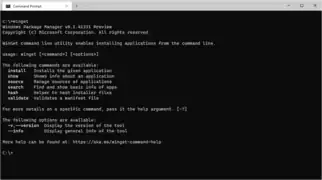Windows Package Manager
The Windows Package Manager (also known as winget) is a free and open-source package manager designed by Microsoft for Windows 10 and Windows 11. It consists of a command-line utility and a set of services for installing applications.[3][4] Independent software vendors can use it as a distribution channel for their software packages.
 | |
 | |
| Developer(s) | Microsoft |
|---|---|
| Initial release | May 13, 2020 |
| Stable release | |
| Preview release | 1.4.2161 (August 6, 2022[2]) [±] |
| Repository | github |
| Written in | C++ |
| Operating system | Windows 10 or later |
| Size | ~23 MB |
| Available in | Chinese, English, French, German, Japanese, and others |
| Type | Package manager |
| License | MIT License |
| Website | learn |
History
Windows Package Manager was first announced at the Microsoft Build developer conference in May 2020.[5][4]
Before deciding to develop Windows Package Manager, the team behind it explored Chocolatey, Scoop, Ninite, AppGet, Npackd and the PowerShell-based OneGet.[4] After the announcement of winget, the developer of AppGet, Keivan Beigi, claimed that Microsoft interviewed him in December 2019 under the pretense of employment and acquiring AppGet.[6] After talking with Beigi, Microsoft allegedly ceased communication with him until confirming one day before the launch of winget that they would not be hiring him. Beigi was dismayed at Microsoft's lack of attribution of AppGet. The release of winget led Beigi to announce that AppGet would be discontinued in August 2020.[6][7][8] Microsoft responded with a blog post crediting a number of winget's features to AppGet.[9][10][11]
Microsoft released version 1.0 of Windows Package Manager on May 27, 2021. The Microsoft Community Repository included over 1,400 packages at that date.[12]
Overview
The winget tool supports installers based on EXE, MSIX, and MSI.[13] The public Windows Package Manager Community repository hosts manifest files for supported applications in YAML format.[14] In September 2020, Microsoft added the ability to install applications from the Microsoft Store and a command auto-completion feature.[15]
To reduce the likelihood of non-Microsoft-approved software (see vendor lock-in), including malicious software, making its way into the repository and onto the target machine, Windows Package Manager uses Microsoft SmartScreen, static analysis, SHA256 hash validation and other processes.[16][17]
The winget client source code and the community manifest repository are licensed under MIT License and hosted on GitHub.[18][14]
Commands[13]
| Name | Description |
|---|---|
| configure | Configures the system into a desired state |
| export | Exports a list of the installed applications |
| features | Show status of experimental features |
| hash | Hash installer files |
| import | Install all the applications in a file |
| install | Install the given application |
| list | Display installed applications |
| pin | Manage package upgrade pins |
| show | Show information about the given application |
| search | Search and show basic information of applications |
| settings | Open winget configuration settings |
| source | Manage application sources |
| upgrade | Upgrades the given application |
| uninstall | Uninstall the given application |
| validate | Validate a manifest file |
Example
The following example searches for and installs variable $PKG_ID.
winget install --id=$PKG_ID -e
Package ID Examples
- Visual Studio Code, a code editor from Microsoft:[19]
Microsoft.VisualStudioCode - Google Chrome:[20]
Google.Chrome - Mozilla Firefox:
Mozilla.Firefox - Brave:
BraveSoftware.BraveBrowser - Vivaldi:
VivaldiTechnologies.Vivaldi
See also
References
- "Windows Package Manager 1.6.2771".
- "preview · microsoft/winget-cli · GitHub". GitHub. Retrieved 2022-08-08.
- Tom Warren (20 May 2020). "Microsoft's new Windows Package Manager is already better than the Windows Store". The Verge.
- Windows Package Manager Preview | Windows Command Line
- Microsoft debuts Windows Package Manager for your dev environment | VentureBeat
- Warren, Tom (28 May 2020). "Microsoft copied its new Windows Package Manager from rival AppGet, claims developer". The Verge. Vox Media. Retrieved June 1, 2020.
- Anderson, Tim (May 28, 2020). "Embrace and kill? AppGet dev claims Microsoft reeled him in with talk of help and a job – then released remarkably similar package manager". The Register. Retrieved 2020-06-01.
- Stewart, Ashley (May 28, 2020). "A developer says Microsoft led him on about a job and buying his tool before going silent and releasing its own very similar service. Now he wants an explanation and credit for his work". Business Insider. Retrieved June 1, 2020.
- Tung, Liam (June 1, 2020). "Windows 10: Microsoft now credits maker of package manager it 'copied' – but offers no apology". ZDNet. Retrieved 2020-06-02.
- Microsoft gives AppGet creator credit for Windows Package Manager - Neowin
- Warren, Tom (April 20, 2022). "Microsoft finally gives AppGet developer the credit he deserves". The Verge. Retrieved 2020-06-02.
- Anderson, Tim (May 27, 2021). "Microsoft releases command-line package manager for Windows (there are snags)". The Register. Retrieved 2021-05-28.
- "Use the winget tool to install and manage applications". Microsoft.
- GitHub - microsoft/winget-pkgs: The Microsoft community Windows Package Manager manifest repository
- Abrams, Lawrence (September 23, 2020). "Windows 10 Package Manager can now install Microsoft Store apps". Bleeping Computer. Retrieved 2020-10-10.
- Tung, Liam (May 21, 2020). "Microsoft's Windows Package Manager: This command-line tool can install all your apps". ZDNet. Retrieved 2020-06-02.
- How to Use Windows Package Manager - Petri
- "GitHub - microsoft/winget-cli: Windows Package Manager CLI (a.k.a. winget)". May 20, 2020 – via GitHub.
- "Winget PKG of Visual Studio Code" https://winget.run/pkg/Microsoft/VisualStudioCode
- "Winget PKG of Google Chrome" https://winget.run/pkg/Google/Chrome